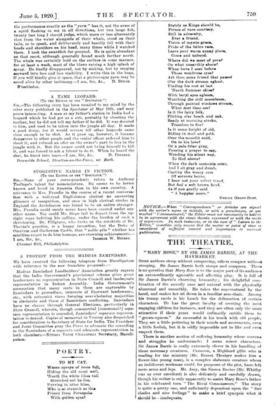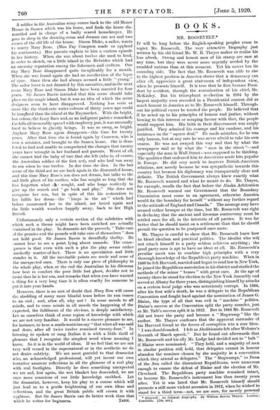THE THEATRE.
" MARY ROSE," BY SIR JAMES BARRIE, AT THE HAYMARK ET.
Soso authors stoop without conquering, others conquer without stooping. Sir James Barrie both stoops and conquers. There is no question that Mary Rose is to the major part of its audience an extraordinarily agreeable and affecting play. It is full of Sir James Barrie's charming humanity ; his delightful com- bination of the morally sane and natural with the physically abnormal and unearthly. He takes the supernatural by the hand, and makes her sit down in a familiar arm-chair. Among his trump cards is his knack for the delineation of certain characters. He has the great faculty of creating the most engaging children for instance, and they are often only the more attractive if their years would ordinarily entitle them to " grown-upness." As successful is his touch with old people. They are a little pottering in their minds and movements, oven a little foolish, but it is oddly impossible not to like and even respect them.
There is another section of suffering humanity whose sorrows and struggles he understands: I mean minor characters. Sir James Barrie is really extremely clever in his handling of these necessary creatures. Cameron, a Highland gillie who is reading for the ministry (Mr. Ernest Thesiger makes him a flower-like young man), is a complex elaborate creature whom an indifferent workman could, for purposes of the plot, have left mere arms and legs. Mr. Amy, the Sussex Rector (Mr. Whitby was as ever excellent) is also delicately and carefully drawn, though his metier is only apparently to assist Mary Rose's father in his celebrated turn " The Rival Connoisseurs." The story is quite a pretty one, and sufficiently dependent upon the " fine shades and nice feelings " to make a brief synopsis what it should be—inadequate. A soldier in the Australian army comes back to the old Manor House in Sussex which was his home, and finds the house dis- mantled and in charge of a badly scared housekeeper. He goes to sleep in the drawing-room and dreams one act and two scenes of the old life of the house. Simon Blake, a sailor, wants marry Mary Rose. (Miss Fay Compton made us applaud his sentiments.) Her parents explain to him a curious episode in her history. When she was about twelve she used to land, in order to sketch, on a little island in the Hebrides which had an uncanny reputation among the fishermen and crofters. One day Mary Rose disappeared quite inexplicably for a month. When she was found again she had no recollection of the lapse of time. Since then she had always seemed a little " young." The sailor lover is not daunted by this narrative, and in the next scene Mary Rose and Simon Blake have been married for four years. Sir James Barrie intended that this scene should take place on the magic island, but it was an idea of which the scene designers seem to have disapproved. Nothing less eerie or more like the third-rate water-colours of thirty years ago could be imagined than the island at the Haymarket. With the bright, hot colour, the fussy lines and, as an indignant painter remarked, Vie hills all inexorably spread with raspberry jam, it was unusually hard to believe in ghostly beings. It was so smug, so bright. Anyhow Mary Rose again disappears—this time for twenty years. After that time she is found again by Cameron, who is now a minister, and brought to the Sussex home. She is deso- inted to find and unable to comprehend the changes that twenty years have wrought in her husband and parents. Worst of all, she cannot find the baby of two that she left (who is, of course, the Australian soldier of the first act), and who had run away to sea when he was twelve. In due time she dies. In the last scene of the third act we are back again in the dismantled house, and this time Mary Rose's son does not dream, but talks to the sad little ghost of his mother, who has sought so long that she has forgotten what th sought, and who longs restlessly to give up the search and " go back and play." She does not recognize her son, but in spite of this his restoration to her fulfils her doom—the " harps in the air " which had before summoned her to the island, are heard again and the little wraith wanders happily away, back to her High Brassil.
Unfortunately only a certain section of the subtleties with which such a theme might have been enriched are actually contained in the play. In dramatic art the proverb, " Take care ;A the pennies and the pounds will take care of themselves " does not hold good. Sir James Barrie is dreadfully thrifty. He cannot bear to see a point lying about unmade. The conse- luence is that even with such a plot the play seems rather markedly matter-of-fact. There is no speculation and little %yonder in it. All the inevitable points are made and none of the unexpected ones. There is only one piece of philosophy in the whole play, when at the end the Australian in his dilemma how best to comfort the poor little lost ghost, decides not to insist that he is her son, and remarks that when you have wanted a thing for a very long time it is often cruelty for someone to put it into your hands.
However, there is no sort of doubt that Mary Rose will cause the shedding of many more blissful tears before its run comes to an end ; and, after all, why not ? In some moods to all minds, and to some minds in all moods the happening of the expected, the fulfilment of the obvious, is deeply satisfactory. Let us ourselves think of some region of knowledge with which we are not very familiar. It would be a sincere pleasure to me, for instance, to hear a mathematician say "that when all was said and done, after all twice twelve remained twenty-four." In listening to spoken or sung Italian it is with a little thrill of pleasure that I recognize the simplest word whose meaning I know. So it is in the world of ideas. If we feel that we are not very well versed in the supernatural or in the aesthetic we do not desire subtlety. We are most grateful to that dramatist who, an acknowledged professional, will yet invest our own tentative amateur reflections in all the glamour of a real play with real footlights. Directly he does something unexpected we are sad, lost again, the wet blanket has descended, we are once more conscious of our little knowledge snubbed. Let the dramatist, however, keep his play to a course which will just lead us to a gentle heightening of our own ideas and reflections, and the great British public will crown it with applause. But Sir James Barrie can do better work than that



































 Previous page
Previous page